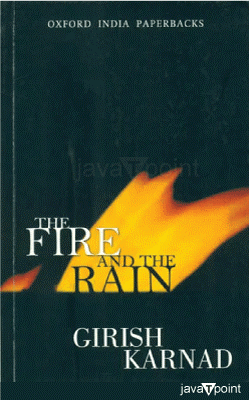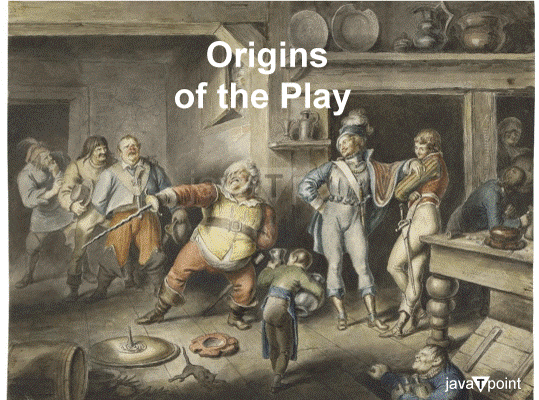Fire and the Rain by Girish Karnad SummaryGirish Karnad's translation of "Agni Mattu Male," a Kannada play based on the Mahabharata's Yavakri Myth, into English, is titled "The Fire and the Rain." 
The play depicts the struggle between good and evil, focusing on desire, passion, retaliation, and betrayal. The drama depicts the main characters' daily activities while contrasting Yavakri's revenge with Arvasu's humanity. Origins of the Play
Karnad's intricate drama, 'The Fire and the Rain', is based on the Mahabharata character Yavakrita's tale. The drama centers on the friendship between two sages named Bharadwaja and Raibhya. To acquire the Vedas from the gods, Yavakri, Bharadwaja's son, traveled to the forest, expressing anger toward the world. The drama took Karnad close to 37 years to finish. Yavakri's harsh lifestyle persuaded Indra that learning from a guru is necessary for wisdom. Despite Bharadwaja's warning against omnipotence fantasies, Yavakri committed a misdemeanor by abusing Raibhya's daughter-in-law. As a result of Raibhya's anger and invocation of the Kritya ghost, his hair was consumed by fire. Yavakri, who took the water-filled urn from his daughter-in-law, was killed by a lady and a rakshasa (demon). The water dried up when the rakshasa pursued Yavakri. Yavakri attempted to enter his father's hermitage but was stopped by a blind man. A rakshasa murdered Yavakri. Bhardwaja was upset by the information and cursed Raibhya, who was in charge of the situation. Then, when Raibhya's sons Paravasu and Arvasu were performing a fire sacrifice for the King, he set himself on fire. Paravasu accidentally killed his father when he wrongly recognized the black deer's skin. He had his father burned and gave his brother Arvasu the order to carry out the Brahminicide penitential ceremonies. Aravasu was asked to leave the sacrificial enclosures because the monarch accused him of murdering Brahmins. When Aravasu prayed to the Sun God, the Sun God granted him the wish to make Paravasu forget his terrible deed and restore Yavakri, Bharadwaja, and Raibhya. But when Yavakri returned, the gods chastised him and commanded him to seek knowledge properly. The Story and Theme of the Play
Karnad uses the story of Yavakri and Indra-Vritra in his drama The Fire and the Rain to explore the exploitative priestly class, human impulses, and negative traits. The Prologue and Epilogue are the story's points of departure between the play's three acts. The main themes include human nature's weakness, misleading information, and retribution. Bhardwaja and Raibhya are revealed to be brothers and cousins, and the play departs from the events of the previous episode by introducing new characters, including Nittilai, tribal people, and actors. Vishakha, a lover of Yavakri who is converted into a female ghost from Raibhya's hair, is also introduced in the drama. The character of Paravasu is portrayed in The Fire and the Rain as a killer who purposefully kills his father out of passion, suspicion, revenge, and jealousy. The drama transforms his identity from a scholarly monk to an artist and centers on his love for Nittilai, a tribal girl. Through their genuine love, the narrative addresses the problem of caste. The narrative of Nittilai and Arvasu with the theater is told in conjunction with the parallel stories of Raibhya and Vishakha in the hermitage, the sacrifice site with Paravasu serving as the Chief Priest, and Nittilai and Arvasu. The most significant contribution to the myth is the tale of Indra and Vritra from the Rigveda. A play-within-the-play starring performers Aravasu and Paravasu depicts the deception of brothers against brothers. The inclusion of the Indra-Vritra story highlights the concern with fratricide in India. The Prologue, which describes the fire sacrifice ceremony, is where the play starts. The ruler of a territory experiencing a drought decides to worship the rain deity, Indra. Raibhya's eldest son, Paravasu, carries out the seven-year process. Following the offering, the actor-manager of a troupe formally requests permission to conduct a play in remembrance of the fire sacrifice. The Prologue emphasizes the protagonists' inner lives, represented by flaming impulses and longing for ultimate emancipation through fire. The first act centers on Nittilai and Arvasu's love marriage, with Andhaka referencing Yavakri's penance and accomplishments. Karnad criticizes Brahmins' propensity to want knowledge for selfish reasons. Yavakri discovers Vishakha's union with his rival cousin Paravasu and discovers her husband's intentions. To exact revenge on Yavakri, Raibhya creates the "Kritya" ghost. Yavakri knows her father-in-law's malicious intent when Vishakha warns him, but he feels confident in his security. By pouring holy water from his kamandalu, Vishkha turns around on Yavakri using this knowledge. Hermitage keeper Paravasu tries to flee to his father's hermitage to preserve his life. Brahma Rakshasa uses a trident to murder him when Andhaka stops him. Despite his wife's seduction by Yavakri and his father's anger, Paravasu is furious when he goes home to visit his wife in the second act. He uses an arrow to kill his father. Paravasu eventually finishes the fire sacrifice, but Arvasu accuses him of killing his father. He is attacked by the King and Brahmins and wounded. The play The Vultures by Vijay Tendulkar and the tale The Fire and the Rain by Karnad both stress the intrinsic evil that is part of human nature, and this narrative does the same. In act three, a married woman named Nittilai visits Arvasu to help him recover. A fierce, emotional world defined by greed and evil is contrasted with a delicate, sensitive world marked by love and kindness in play. Nittilai and Arvasu symbolize love and goodness, whereas Raibhya Paravasu and Yavakri represent evil, malice, and ill intent. Arvasu receives guidance from the actor-manager on proper mask acting. Arvasu portrays the demon Vritra in the play-within-the-play Indra Vishwarupa and Vritra, where the epilogue leads the audience. Due to his jealousy, Indra attempts to murder Vishwarupa, but he stops himself because of Vritra's status as a demon. As a result, Vishwarupa is knocked unconscious, and Indra is forced to back down. Through the fratricide incident, Karnad's play inside play examines the reciprocal link between theater and life. The rising sounds and motions on stage, such as Indra's laughing, Vishwarupa's screams, and Paravasu's terrified outburst, confound the audience. As Paravasu refers to the demon Brahma Rakshasa, replicating his brother's acts, the similarity between Paravasu and Arvasu is complete. Arvasu assaults Indra while still acting, but Nittilai removes his mask and restores him to normality. But as soon as her brother and husband arrive, her husband brutally stabs her to death. When Arvasu brings her body to the site of sacrifice, Indra's voice instructs her to request any blessing which will be given. Arvasu requests that Indra free Brahma Rakshasa after recalling Nittilai's kindness. Rain symbolizes the heroic self-sacrifice of Nittilai and Arvasu's human sacrifice as the play comes to a close. The play-within-a-play device popularized by Shakespeare bridges the gap between the main narrative and the subplot and causes an unexpected turn of events. Summary
A tiny area of India had gone ten years without Rain when the events of the drama The Fire and the Rain took place. The monarch suggested offering fire sacrifices as an act of worship to the Gods. God should be delighted; then the dry country would get Rain. Paravasu, the son of the knowledgeable Brahmin Raibhya, was the chief priest for this fire sacrifice. This appointment and some other characters' disappointments are discussed throughout the play. One thing that disappointed us was how much stress was placed on seniority based on age, which has always been honored about the father according to traditional Indian culture. Because they have had more life experience, older individuals have traditionally been seen as wiser. According to this custom, the knowledgeable Raibhya should have been chosen as the head Priest, but the King chose Paravasu, the older son, instead due to longevity concerns. The senior was dissatisfied and in agony about this appointment. The temple's head priest, Paravasu, is eager to conduct a ceremony to induce Rain. In the first line of this The Rain, a representative of a company of actors declares their wish to produce a dramatic play for the Gods' amusement. After considerable deliberation, the group is allowed permission to participate in the fire sacrifice. This ensemble of actors is performing two audiences for the play: the survivors of the drought-stricken kingdom and the first group offering the fire offerings. The play's real audience makes up the second group. It means that the play presented by the ensemble is part of the more significant work entitled "The Fire and the Rain." Aravasu, Paravasu's younger brother, is now seeing Nittali. She belongs to a lower caste than Aravasu, and there are differences between Brahmin and tribal practices. Aravasu is a Brahmin. Tribes can propose to someone or declare a marriage more freely and openly. According to tribal rules, a declaration of being healthy and ready for marriage had to be made in front of the entire community. Being a Brahmin unfamiliar with the concept, Aravasu felt anxious and ashamed to observe this tribal tradition. Aravasu fully knows his place in his family and understands that everyone views him as inferior and useless. Additionally, he is unambiguous about the one thing he truly desires: to dance, sing, act, and be with his beloved Nittilai. As a result of leaving Vishaka, who is having an affair with Paravasu's first cousin Yavakri, Paravasu has marital issues. Yavakri, who has just returned after ten years of meditation, believes that Paravasu is unfit to be the high priest. He does not behave or communicate in a pure or enlightened way. Even after all his penance and sacrifice in God's name, he still gives in to lust and craves wrong things for an enlightened monk. As a result, Yavakri is similar to the person he was ten years ago. Despite all the apparent "knowledge" he seems to have gained, he remains as ignorant, unruly, and crude as he was before. He cannot masterfully restrain his emotions and impulsive behaviors. Despite his expertise, he cannot recognize when his comments or actions are improper. Through this, the writer brings out the contrast between knowledge and wisdom. The father of both Paravasu and Aravasu, the blind Rabiya, attracts a demon to murder Yavakri, and he begs Vishaka to spare her beloved by requesting that he spend the whole day inside his home. When Vishakha overhears her father-in-law's remarks, she turns to Aravasu for assistance. Yavakri is already dead when Aravasu arrives to save him from the demon. After concluding Yavakri's burial ceremonies, Aravasu arrives at the location of Nittilai's village. That day, Nittilai's father would meet with Aravasu to ask permission to get married. Aravasu's father loses patience and gives her marriage to the first volunteer because of the delay in her arrival at Nittilai's village caused by cremation tasks and other family issues. Father and son are different in the choice of Paravasu for the fire sacrifice as opposed to the father, who is more senior in knowledge, experience, wisdom, and age. After witnessing his son's behavior upon returning home when there is still one month till the sacrifice ritual, the father's view of the King's choice is either highly negative or worsens. In response to Rabiya, Pravasu said that no one would be aware if he returned to the ceremony in the morning. The father was astounded by this reaction because the sacrifice ceremonies were performed more for one's benefit and the benefit of God than for the benefit of the community. The monarch frequently claims that he would have chosen you as the Chief Priest. However, it was a seven-year ritual. A younger man, they reasoned, would be safer. Indignant and resentful at the King and son's behavior, Raibhya tells you to send that fool somewhere else if you want some alone time with your woman. I do not require him. One must be on the lookout for people rather than wild animals. As a result of Raibhya's disruption of the sacrifice by killing Yavakri and his inappropriate behavior with his daughter-in-law Vishakha, Paravusu murders him shortly after. Raibhya's father thus deserved to die, in Paravasu's opinion. He tells Aravasu that he must go back to look over the yojana and cannot leave the sacrifice's grounds before the appointed period has passed. When Arvasu carries out his brother's instructions, he is falsely convicted of murder and nearly killed by beatings. The acting manager saves a dying Aravasu, revived by his devoted Nittilai. Arvasu, who had been hurt emotionally and physically by his brother, is given a healing touch by Nittilai's compassion and concern in his time of need. Arvasu believed that the recent series of events occurred because he would reject his caste by getting married to Nittilai, and he intended to get retribution for the betrayal by his brother. He left Nittilai because of the two fatalities and what happened. By denying him permission to carry out his duties and by creating a situation in which he cannot wed Nittilai, Paravasu exacts revenge on his brother in two different ways. Nittilai, who came from a hunter tribe that lived close to nature, was a practical common sense expert. Since she believed that Arvasu's attempt at retaliation would result in more violence, she discouraged Arvasu from the proposal. More grief and suffering would result from this. The bloodbath of vengeance had no power to repair or modify anything that had gone wrong. She suggested leaving things as they were to lessen pain. In front of Paravasu, the priest, and the people, Aravasu performs while wearing a mask after regaining his power. At a pivotal moment in the play, Aravasu departs from the plot to destroy the temple, murdering Paravasu, and the Nittilai villagers discover her in the audience and kill her. Aravasu is holding a dying Nittilai when the God Indra unexpectedly comes and offers to give him one desire. Aravasu may request that it Rain, but it is apparent that he wants Nittilai to live. A request like that, according to Indra, would turn back time, but eventually, the same things would keep happening. The demon that killed Yavakri then appears and begs Aravasu to request Indra for his liberation from a condition that prevents him from living normally or passing out peacefully. Aravasu then petitions Indra for the demon's release, claiming that Nittilai would have chosen the same decision. There is a lot of rainfall. |
 For Videos Join Our Youtube Channel: Join Now
For Videos Join Our Youtube Channel: Join Now
Feedback
- Send your Feedback to [email protected]
Help Others, Please Share









